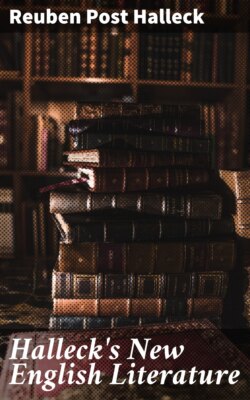Читать книгу Halleck's New English Literature - Reuben Post Halleck - Страница 21
На сайте Литреса книга снята с продажи.
SUGGESTED READINGS WITH QUESTIONS AND SUGGESTIONS
ОглавлениеThe student who is not familiar with the original Anglo-Saxon should read the translations specified below:—
Scopic Poetry.[33]—Widsið or the Far Traveler, translated in Morley's English Writers, Vol. II, 1–11, or in C. & T.,[34] 3–8.
The Wanderer, translated in P. & S., 65–68; C. & T., 50–55; Brooke, 364–367.
The Seafarer, translated in P. & S., 68–70; C. & T., 44–49; Morley, II., 21–26; Brooke, 362, 363.
The Fortunes of Men, trans. in P. & S., 79–81; Morley, II., 32–37.
Battle of Brunanburh, Tennyson's translation.
What were the chief subjects of the songs of the scop? How do they reveal the life of the time? Is there any common quality running through them? What qualities of this verse appear in modern poetry?
Beowulf.—This important poem should be read entire in one of the following translations:
Child's Beowulf (Riverside Literature Series);
Earle's The Deeds of Beowulf, Done into Modern Prose (Clarendon Press);
Gummere's The Oldest English Epic;
Morris and Wyatt's The Tale of Beowulf;
Hall's Beowulf, Translated into Modern Metres;
Lumsden's Beowulf, an Old English Poem, Translated into Modern Rhymes (the most readable poetic translation).
Translations of many of the best parts of Beowulf may be found in P. & S. 5–29; C. & T., 9–24; Morley, I. 278–310; Brooke 26–73.
Where did the exploits celebrated in the poem take place? Where was Heorot? What was the probably time of the completion of Beowulf? Describe the hero's three exploits. What analogy is there between the conflict of natural forces in the Norseland and Beowulf's fight with Grendel? What different attitude toward nature is manifest in modern poetry? What is the moral lesson of the poem? Show that its chief characteristics are typical of the Anglo-Saxon race.
Caedmonian Cycle.—Some of the strongest passages may be found in P. & S., 30–45; C. & T., 104–120; Morley, II. 81–101; Brooke, 290–340. Read at the same time from Milton's Paradise Lost, Book I., lines 44–74, 169–184, 248–263, and passim.
What evidence do we find in this cycle of the introduction of Christianity? Who takes the place of Grendel? What account of Caedmon does Bede give? What is the subject matter of this cycle?
Cynewulf Cycle.—The Poems of Cynewulf, translated by C.W. Kennedy. Translations of parts of this cycle may be found in Whitman's The Christ of Cynewulf, and The Exeter Book, translated by Gollancz. Good selections are translated in P. & S., 46–55; C. & T., 79–103; and 132–142: Morley, II., 206–241; Brooke, 371–443. For selections from the Phoenix, see P & S, 54–65; C.& T., 143–163.
What new qualities does this cycle show? What is the subject matter of its most important poems? What is especially noticeable about the_ Andreas and the Phoenix_?
General Characteristics of the Verse.—What is its usual form? What most striking passages (a) in Beowulf; (b) elsewhere, show the Saxon love of war and of the sea? Instance some similes and make a list of vivid metaphors. What are the most striking parallelisms found in your readings? What conspicuous differences are there between Saxon and Celtic imagery? (See Morley, l, 165–239, or Guest's Mabinogion). What excellencies and defects seem to you most pronounced in Anglo-Saxon verse?
Prose_—The Anglo-Saxon Chronicle_ and Bede's Ecclesiastical History are both translated in one volume of Bohn's Antiquarian Library. The most interesting part of Bede for the student of literature is the chapter relating to Caedmon (Chap. XXIV., pp. 217–220).
In the Chronicle, read the entries for the years 871, 878, 897, 975, 1087, and 1137.
Alfred's Orosius is translated into modern English in the volume of Bohn's_ Antiquarian Library_ entitled, Alfred the Great, his Life and Anglo-Saxon Works, by Pauli. Sedgefield's translation of the_ Consolations of Boethius_ distinguishes the original matter by Alfred from the translation. Selections from Alfred's works are given in C. & T.(Prose), 85–146, and in Earle's Anglo-Saxon Literature, 186–206.
For selections from AElfric, see C. & T. (Prose), 149–192. Read especially the Colloquies, 177–186.
What was Bede's principal work? Why has Alfred been called the "father of English prose"? What were his ideals? Mention his chief works and their object. What is the character of AElfric's work? Why are modern readers interested in his Colloquium?
Why is the Anglo-Saxon Chronicle important?
